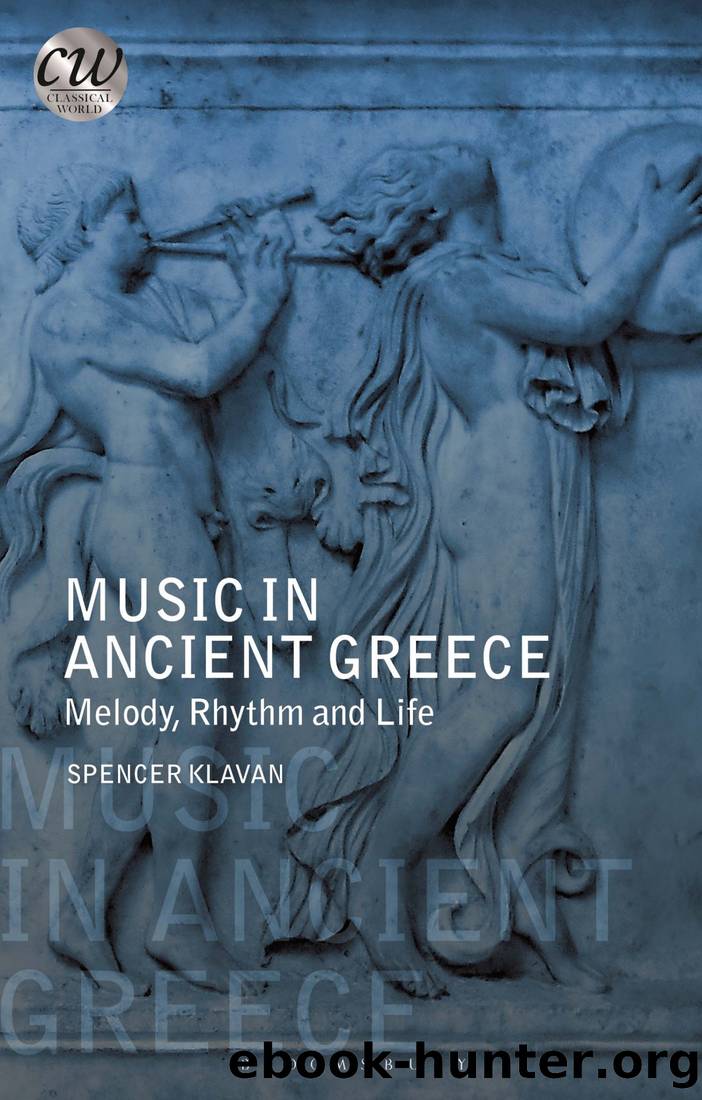Music in Ancient Greece by Spencer Klavan;

Author:Spencer Klavan; [Klavan, Spencer A.]
Language: eng
Format: epub
ISBN: 9781350119956
Publisher: Bloomsbury
Published: 2020-11-25T00:00:00+00:00
Music in society
By now weâre starting to see why Damon might have thought music was so important for politics. âA cityâs musical fashions never change without a change in the most important laws as wellâ: if melodies and rhythms mould young souls, and young souls grow up to be state leaders, and state leaders get to write laws, then a societyâs musical tastes are the seeds of its legal and political systems. The moral character of the elite boys whose musical education we studied in Chapter 4 was therefore crucially significant. It would have mattered intensely to parents and teachers that such boys be raized with the right tunes in their ears.
Thatâs why Plato wonât allow the youngsters who will eventually lead his perfect Republic to listen to anything other than the Dorian and Phrygian modes. Itâs why Aristotleâs comments about musical education come at the end of his book on Politics, which itself is the sequel to his book on the moral formation of young men, the Nicomachean Ethics. Looking back on the history of Rome, Aristides Quintilianus wrote that âwhen the body politic had experience with leaders who lacked musical acculturation, she witnessed the reality of what Plato prophesied in the Republic â she saw her citizens ruthlessly shedding one anotherâs blood.â14 The musical training of a cityâs impressionable leaders-to-be was literally a matter of life and death for anyone who would live under the laws written by those same young people.
This wasnât just an abstract intellectual exercize for the Athenians. Think of all the parts of life in ancient Greece which had music at their centre. Consider again the slaves who entertained their masters at drinking parties, and the boastful songs the masters themselves would sing to show off their skills. The trumpet tunes that Greek generals would use to rouse soldiers into battle. The musical celebrations that were awarded to leaders and noblemen when they won athletic competitions, and the pride which Athenian leaders took in hosting musical contests of their own. Consider, too, that the songs we now think of as music were only supposed to be the audible version of a much bigger mousikÄ â an overarching social, moral, and cosmic order which governed the whole universe. Athenians in the ancient world heard songs almost everywhere they went, and those songs were more than just a background soundtrack. They were statements about how life ought to be lived, tools for teaching the public and reinforcing â or, in the wrong hands, undermining â the social order.
Maybe this seems silly. When Plato outlaws artists like Homer and the tragedians from his ideal state because their songs donât portray the right kind of morality, he often sounds to modern readers like a fussy old curmudgeon at best, and a kind of proto-fascist at worst. The notion of a society getting so worked up about art that they would condemn musicians to exile feels foreign, even primitive â imagine a piano teacher having to flee the country because she taught too much Brahms and not enough Bach.
Download
This site does not store any files on its server. We only index and link to content provided by other sites. Please contact the content providers to delete copyright contents if any and email us, we'll remove relevant links or contents immediately.
The Daily Stoic by Holiday Ryan & Hanselman Stephen(3292)
The Fate of Rome: Climate, Disease, and the End of an Empire (The Princeton History of the Ancient World) by Kyle Harper(3051)
People of the Earth: An Introduction to World Prehistory by Dr. Brian Fagan & Nadia Durrani(2721)
Babylon's Ark by Lawrence Anthony(2666)
Ancient Worlds by Michael Scott(2665)
The Daily Stoic by Ryan Holiday & Stephen Hanselman(2563)
Foreign Devils on the Silk Road: The Search for the Lost Treasures of Central Asia by Peter Hopkirk(2453)
India's Ancient Past by R.S. Sharma(2441)
MOSES THE EGYPTIAN by Jan Assmann(2410)
The Complete Dead Sea Scrolls in English (7th Edition) (Penguin Classics) by Geza Vermes(2269)
The Earth Chronicles Handbook by Zecharia Sitchin(2215)
Lost Technologies of Ancient Egypt by Christopher Dunn(2211)
24 Hours in Ancient Rome by Philip Matyszak(2072)
Alexander the Great by Philip Freeman(2059)
Aztec by Gary Jennings(2017)
The Nine Waves of Creation by Carl Johan Calleman(1905)
Curse Tablets and Binding Spells from the Ancient World by Gager John G.;(1857)
Before Atlantis by Frank Joseph(1845)
Earthmare: The Lost Book of Wars by Cergat(1815)
